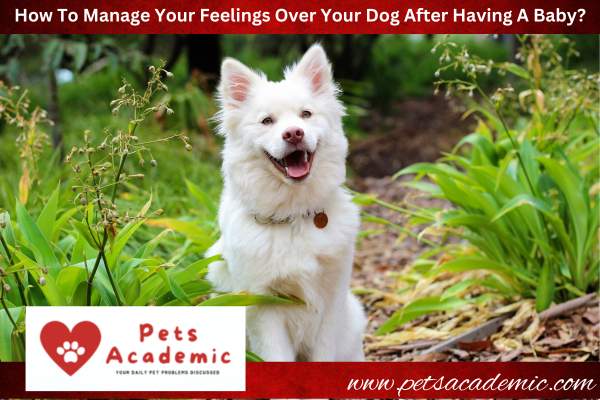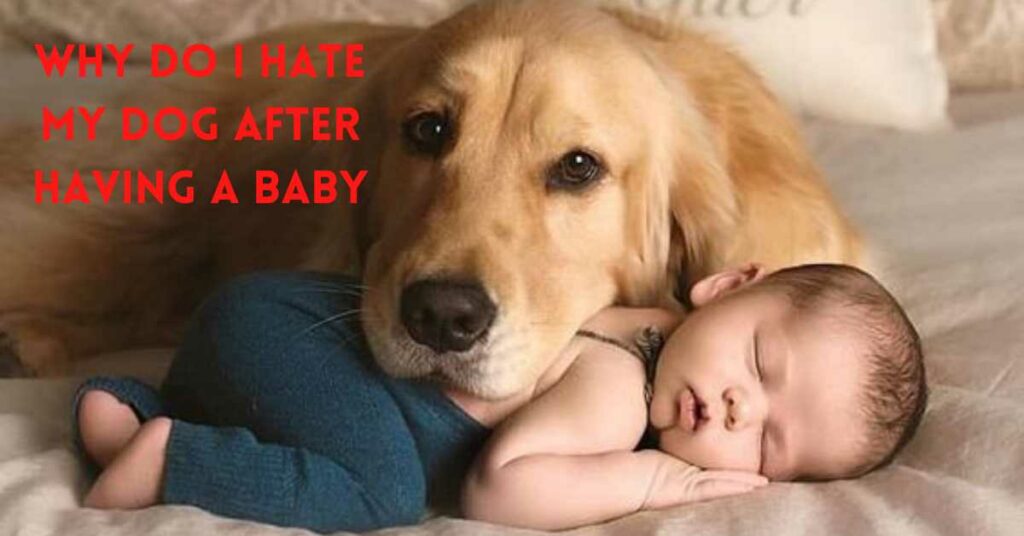After having a baby, many moms experience a shift in their emotions towards their pets, especially towards their dogs. The once loyal and playful puppy may suddenly become a source of frustration and annoyance.
This change in emotions can be attributed to several factors. Firstly, a newborn requires constant attention and care, leaving the mom exhausted and overwhelmed.
This lack of sleep and the demands of the baby may result in less time and energy devoted to the dog. Additionally, dogs can become jealous and resentful when they are no longer the center of attention.
The dog may act out through barking excessively, chewing furniture, or exhibiting aggressive behavior towards the baby.
As a result, the mom may develop negative feelings towards her beloved pet. However, it is important to remember that these feelings are temporary and can be overcome with patience and understanding.
Seeking the guidance of a professional dog trainer can help address any behavioral issues and ensure a harmonious relationship between the mom, the baby, and the dog.
With time and effort, it is possible to rebuild the bond and create a loving and nurturing environment for everyone in the household.
Reasons Why Do You Hate Your Dog After Having A Baby

1. Unfamiliarity: Having a baby can be stressful and overwhelming for many parents, especially first-time parents. This sudden change in routine can lead to feelings of unfamiliarity and resentment towards their beloved pet dogs as they may feel like their pup is no longer part of the family and that their bond has weakened. This feeling may also be magnified by a lack of time and energy to spend with the dog.
2. Displacement: With the arrival of a new baby, parents may start to feel like their pet’s needs are secondary and that they must put their child first. This is known as “displacement”—a feeling where one’s love and attention shifts from the pet to the baby. It is important to remember that your pup can still be a part of the family; it will just take some adjusting and understanding on everyone’s part!
3. Anxiety: Parents often feel guilty for having feelings of anger or irritation towards their pet dog, and this guilt can lead to anxiety. This anxiety can then be directed towards the pet itself, creating further feelings of animosity.
How To Manage Your Feelings Over Your Dog After Having A Baby?

1. Establish Boundaries: Creating boundaries is essential in any family dynamic, and it’s no different when it comes to having a pet. Set up rules for your pup to follow and make sure that everyone in the family understands them. Establishing these boundaries also allows you to have more control over your pup’s behavior and will help alleviate some of the tension in the house.
2. Create Time For Your Dog: While it may be difficult to carve out time for yourself with a baby, it is important to make sure that your pup gets enough attention too. Schedule specific times for playing, training, and bonding with your dog—even if it’s just a few minutes here and there.
3. Show Your Love: Sure, you can’t cuddle with your pup as much as before—but that doesn’t mean that you can’t show your love in other ways. Offer small treats, rubs behind the ears, or a few extra belly scratches to let your pup know how much they mean to you!
4. Seek Help: If things really get tough and you find yourself struggling with negative emotions towards your pet, don’t hesitate to reach out for help. Consulting a professional or taking part in dog-training classes can be incredibly helpful in bringing back the love between you and your pup.
How To Cope With Negative Emotions Toward Your Pet?

It can be hard to cope with negative emotions toward your pet.
It’s important to remember that having a pet is a big responsibility, and it requires patience, understanding, and lots of love.
Here are some tips for dealing with negative feelings:
1. Recognize the emotion – Acknowledge what you’re feeling without judgment. It’s okay to feel upset or frustrated, but it’s important to be aware of your emotions and allow yourself to process them.
2. Talk it out – Talking to someone can help you work through difficult emotions and gain a new perspective on the situation. Whether you talk with a family member, friend, or professional counselor, being able to share your thoughts and feelings can help reduce stress.
3. Take a break – If the negative emotions become too overwhelming, step away for a few minutes (or longer if needed). Go for a walk or run, listen to music, or do something creative to give yourself time and space to process what you’re feeling.
4. Reframe your thoughts – Instead of thinking about what’s wrong, refocus on the positive aspects of owning a pet. Think about all the joy and love they bring you and how much better life can be with them in it.
5. Show compassion – Showing kindness to yourself is just as important as showing kindness to your pet. Take time to practice positive self-care and show yourself some compassion.
It’s normal to feel a range of emotions when caring for a pet, but it doesn’t have to be all negative. With patience and understanding, you can learn how to cope with any difficult feelings and still enjoy the bond between you and your pet.
Tips For Reconnecting With Your Dog After Having A Baby

1. Start Slow: It can seem overwhelming to jump right into introductions when you first bring your baby home, so take it slow. When introducing the dog and baby, allow them to become familiar with each other’s scents before attempting physical contact.
2. Give Lots of Attention: Make sure that your dog is still getting plenty of attention from you. This may mean taking the extra step to give them a pat on the head or an extra belly rub when you’re busy with your baby.
3. Increase Exercise: Having a baby can limit your time for daily walks, but it’s important that your dog still gets enough exercise and mental stimulation each day. Find ways to increase their physical activity, such as playing fetch or hide-and-seek.
4. Play Together: Make time for you and your dog to spend quality, one-on-one bonding time together. This can be something as simple as a game of tug-of-war or going on a leisurely walk around the neighborhood.
5. Be Patient: Don’t expect a perfect transition right away. Remember to be patient and understanding with your dog as they adjust to their new family dynamic. With patience, love, and consistency, your bond with your pup will grow even stronger!
6. Professional Help: If you feel that your dog is having difficulty adjusting to the new addition, consider seeking help from a professional animal behaviorist. They can assess the situation and provide helpful tips for dealing with any issues that may arise.
7. Set Boundaries: It’s important to set boundaries with your pup so they know what is and isn’t allowed, especially when it comes to interacting with the baby. Establish rules such as no jumping or barking around the baby and reward them for good behavior.
8. Celebrate Progress: Finally, don’t forget to celebrate your pup’s successes! Every positive interaction between your dog and your baby should be acknowledged and rewarded. This will help foster a healthy relationship between the two as they get to know each other better.
With these tips in mind, you can create a smooth transition for your pup and baby to start building their strong bond.
Good luck!
Conclusion On Why Do I Hate My Dog After Having A Baby?
After having a baby, many people may experience a shift in their feelings towards their pets, specifically a dog or cat.
The constant wake up calls and the added responsibility can be overwhelming, leading to negative emotions directed at the family pet. The dog, who once provided companionship and love, may now be seen as a burden.
The lack of sleep due to the demands of the baby can amplify these negative feelings. The dog’s behavior may also contribute to the growing resentment. Perhaps the dog is not adjusting well to the new addition to the family or is not properly trained.
These factors can lead to frustration and resentment towards the dog. In some cases, people may even contemplate getting rid of the dog or getting another dog that may be better suited for the family dynamic.
However, it is important to remember that these negative feelings towards the dog are likely temporary and may dissipate as the family adjusts to their new routine and the baby grows older. With proper dog training and patience, the dog can become a cherished member of the family once again.
Related Posts: What Category Are Poodles in Dog Shows?

